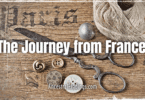Today, we travel back to the rugged Highlands of Scotland a place of mist, stone, and memory.
For centuries, families called those hills home until change swept through the glens and sent them searching for a new beginning across the sea.
This is not a history lesson; it’s a glimpse into what those moments might have felt like: the heartbreak of leaving, the courage it took to start again, and the quiet faith that carried them to a new world.
Settle in, and picture it: the wind through the heather, the sound of the waves on a ship bound for Nova Scotia, and the hope that somehow, they would build a life worth the leaving.
This is a Journey from Scotland: Courage and Hope…
Morning began with mist that curled along the hill like breath. Ewan rose before the light had gathered in the glen, pulled on his woolen jacket, and crossed the yard to the byre. The cow turned its mild face at his step, warm air puffing from its nostrils in the cold. He set the pail, pressed his forehead to the flank, and listened to milk ring the tin. The sound was small and steady. On mornings like this, it steadied him.
Inside the cottage, peat smoke climbed through the hole in the roof and drifted out into the white air. His mother, Mairi, moved quietly around the hearth. She broke oatcake in half and set one piece by his bowl. The fire caught at last and sent a clean orange through the room. Ewan’s younger brother, Fergus, slept in a heap near the warm wall, face hidden in his blanket. Isla, thirteen and quick with her hands, sat near the light and mended a tear in her apron with tiny neat stitches.
Alasdair, their father, coughed from the bed-corner. The cough had a deep rattle to it that made Mairi look up from the fire. She went to him, laid her palm on his brow, and smoothed back his hair. He shut his eyes and breathed until the fit passed.
Ewan poured himself a bowl of brose and sat by the door. He watched the mist move over the ridge. It felt alive, as if it walked. He had always thought of the hills as older than any story, and the mist as the way they spoke.
A knock came at the door. Not the tap of a neighbor. A firm set of three that Ewan felt in the floorboards. Mairi’s hand paused above the pot. Ewan set his bowl aside and opened the door to two men in wool coats with wet shoulders. Behind them stood a third, younger, who held a leather bag under his cloak. Their faces had the tight look of men who carry news and prefer not to carry it.
“Ewan MacLeod,” the older one said.
“Aye.”
“Your mother Mairi. Your father is Alasdair MacLeod.”
“Aye,” Mairi said, calm, though Ewan saw her knuckles whiten around the spoon.
“I am Duncan Kerr, factor to the estate. We bring word from the laird. There is to be a change of tenancy. By midsummer the croft will pass to sheep. You are to present yourselves at the quay at Kilbrannan in six weeks’ time for assisted passage. There will be land abroad. Timber and wages until you are settled. That is the instruction.”
The cottage went still. Even the cow shifted in the byre and then stood quiet, as if it understood.
Mairi found her voice first. “My husband is ill.”
“The instruction allows for the infirm,” Kerr said. “Ships sail in July. The steward has lists for families. Your names are on them.”
“Whose hand put them there,” Ewan asked.
“The steward’s. By order.”
Ewan looked at his father. Alasdair had turned his face to the wall and shut his eyes. The line of his back did not move.
“We planted barley in the upper strip,” Ewan said. “It is in sprout. There is hay in the loft and a cow in milk.”
Kerr did not answer for a moment. Water dripped from his hat. He took out a folded paper, read a line, folded it again, and set it back. “You will be allowed to sell your improvements to the estate at fair rate. A cart will be sent for trunks. The passage is paid from the rent arrears, which are forgiven in full upon embarkation. It is a generous arrangement.”
Isla’s needle paused above the cloth. “Generous,” she whispered, and put her head down so only the thread moved.
Kerr’s face did not change. “You have six weeks. The steward will come for a tally of your goods next market day.”
They left as they had come, their boots leaving dark prints on the stone.
When the door closed, sound returned. The water hissed on the fire. Fergus stirred, made a soft noise, and went still again. Ewan looked at his mother. She looked at him. Neither spoke. Words felt heavy in the throat.
At length Mairi stood and went to the bed. “Alasdair,” she said softly. “We will meet this as we have met the winter. One day and then the next.” She smoothed the blanket. “We will go together.”
He turned his face toward her. “I thought to lie under these hill stones,” he said, voice rough. “My father is there, and his father before him.”
Mairi laid her hand over his. “A grave is not the only way to belong. You have given these hills your life. They will keep it.”
Ewan took his shawl and stepped out into the yard. The mist had thinned. Thin sun lit the ridge, and the river below sent a ragged shine through the alder. He walked to the upper strip and stood at the field’s edge. New green lines ran across the brown. He knelt and put his palm against the earth. It was cold, and it was his. He stayed until his knees ached and he rose only when he could keep the heat from the fire no longer in his clothes.
The news ran ahead of them to every house in the glen. In the days that followed, neighbors came by with quiet faces. Some had had their own knocks. Some knew they were next. There was little to say. People spoke of weather, as if naming wind and rain could steady them. They traded tools, and borrowed carts, and promised to keep an eye on beasts until the day came when there would be no beasts to watch.
On the last night before the steward’s tally, Mairi cleared the table and set the good bowls. She had kept back a little butter and a handful of dried berries, and now she set them out as if it were a feast day. They ate slowly. After, she set the old tin whistle in Ewan’s hand. “Play,” she said.
He brought it to his mouth and sent a slow air into the room, a tune his grandfather had taught him. The notes rose and moved around the rafters. Isla hummed under it. Mairi’s voice came in even and true. Alasdair closed his eyes and the corner of his mouth lifted, a line of peace at last on his worn face.
When the steward came, he was brisk and careful with his tally. The cow went to a neighbor. The loom went to a man three hills over who had sons to help him. The chest would follow them to the quay. The Bible went in the chest, wrapped in cloth, although Mairi kept it out at night to read and then laid it back as if she were laying a child to sleep.
On the morning they left, the hill lay clear under a pale blue sky. The ridge that had been a shield their whole lives looked close enough to touch. Ewan turned at the door and held the latch in his hand. He could feel the smooth worn place where his father’s palm had rested for years. He pressed his thumb there once, and then let it go.
They walked with the first sun on their backs. The path wound through bracken and heather, past a standing stone that had watched men pass for centuries. Fergus tried to count his steps and fell out of count and began again. Isla carried a small bundle and the tin whistle tucked in the crook of her elbow. Mairi walked with a steady stride, one hand lightly on Alasdair’s arm. He walked with effort. Each rise took his breath. He did not complain. He saved his breath to look.
At the ridge they turned for a last sight. The cottage was a small dark square against the green. The byre roof caught the light. Thin smoke rose from the roof hole and stood straight for a moment, a thread that seemed to hold them to the place. Then it thinned and drifted.
At the quay at Kilbrannan the world widened. Boats bobbed at their ropes. Men shouted to one another. Women sat on trunks with babies in their arms and bundles at their feet. The ship that would carry them stood out from the others. Its sides were tar black and shining. The name on its stern read Marigold of Greenock. A boy with red hair leaned over the rail and waved at Fergus, who waved back, then hid behind Ewan’s coat.
The steward ticked their names and pointed them aboard. The slope of the gangplank made Mairi catch her breath. Ewan put his shoulder under his father’s arm, and together they climbed. The deck smelled of salt and tar and old wood. Ropes coiled like sleeping snakes near the mast. The crew moved with quick steps and shouted words that sounded like a language of its own.
Below decks, space was narrow and dark. Berths ran along the sides, planks with thin straw mattresses. There was a place for each name. The air held the sour of old voyages. It would grow worse, Ewan knew, when the ship left the shore and the air could not clear.
Night came with the tide. The ship tugged at its ropes like a dog eager to run. Fergus fell asleep with his head on Ewan’s knee. Isla’s eyes stayed open a long time in the dim. “Will they take the house apart,” she asked softly.
“They will let the roof fall,” Ewan said. “Stone does not mind the weather.”
“Will the oak come up through the floor,” she asked.
He thought of the acorn he had wedged in the crack by the hearth as a boy, a game to see if it would sprout. He had forgotten it until now. “Perhaps,” he said. “Perhaps the roots will lift the stones.”
At dawn, the ship eased from the quay. Voices rose and fell. A woman cried out for a man still on the shore. He ran three steps along the quay and could not run further. He lifted his hand. The woman lifted hers. The ship turned its nose toward the mouth of the bay and the land slid away as if pushed by an unseen hand.
Sea days blurred and sharpened by turns. In fair weather, the deck was a place of air and light. The children were allowed up to watch the waves. They held the rail and laughed when the bow cut through a swell and sent a spray into the sun. In foul weather, everyone stayed below, hunched and quiet. The ship creaked. The berths groaned. Men went up to be sick and came down again with faces gray as clay.
Mairi kept a strict order in their small space. She cleaned what could be cleaned and made tasks for idle hands. She had Isla turn the heel of a sock for Alasdair, even though the old sock might not last the voyage. She set Fergus to count the knots in the plank above their heads. She gave Ewan the pot and told him to fetch water, and when the sailors said wait, she looked at Ewan and he waited, because a man can do that for his mother when there is nothing else to do.
On the fourth week, sickness went through the lower deck. It took the light from faces and left a sweat on lips. A child two berths away failed in a night, his breath going down like a candle. The sailors wrapped him and the sea took him with a prayer. Mairi held Fergus when he cried, and she rocked him without words, her cheek pressed to his hair.
Alasdair failed more slowly. The cough deepened. There were mornings when he woke and smiled and asked about the light on the water. There were evenings when he slept hard and did not wake for the soup. He tried to speak to Ewan and could not. Later he managed it. “Look out for them,” he said. “Mind your sister. Mind your mother. Make your strength go where it matters.”
Ewan nodded and felt an ache in his throat that felt like pain and iron and a promise all at once.
On a day when the sea lay quiet and the sails hung loose in a breathless air, a school of dolphins came and ran under the bow. The sailors shouted and laughed. Fergus leaned over the rail until Ewan held him by the belt. Isla counted the sleek backs and lost count and began again. For a time no one thought of the dark below.
Land came at last like a smudge, then a line, then trees that rose out of the water as if the sea had given birth to a forest. The air changed. It smelled of resin, sharper than peat, and clean like a new-chopped board. The captain called out orders. Lines flew. The ship eased toward a harbor with low buildings and a flag that snapped in the wind. A man on the quay waved a hat, then both arms, as if to pull them in by hope.
They came ashore with legs that felt wrong, the ground too still after weeks that moved. A man with a book took their names. Another man pointed to a shed where a woman ladled thick stew into wooden bowls. A third asked for strong backs to carry timber. The world had more voices than Ewan could hear at once.
They were given a place to sleep that first night, a long shed with straw on the floor and a door that did not quite shut. Wind found the crack and whispered through it. Fergus slept and smiled in sleep, as if he chased something in a dream and caught it at last. Isla lay with her back to the wall and her hands folded under her cheek. Mairi sat with her back against a post and held Alasdair’s hand in both of hers.
He went near dawn. His breath had been light for hours. In the first thin light it lightened again and did not return. Mairi did not cry out. She closed his eyes with her fingers and laid her palm on his chest. Ewan stood still and let the moment draw a line across his life. He felt himself on one side of it and everything he had been on the other.
The men of the settlement came and carried the body to a small rise above the harbor. There were not many stones yet. The ground there had only begun to learn its work. The minister said simple words. Mairi’s face was calm. She pressed a sprig of fir into the new earth.
Afterward, the day did not pause. The foreman called for men to cut timber upriver. There was a wagon to be loaded. There was a line of settlers to take tools. Ewan felt the call of the work like a rope on his shoulder. He looked at Mairi. She nodded once. He lifted the axe and walked toward the trees.
The forest was not like the hills. It closed over the head and shut out the sky. Sunlight came through in pieces. The trees were tall and straight and heavy, and when one fell it spoke a deep word that shook the ground. The men worked in pairs, one to notch, one to wedge, then both to haul and limb, their hands sticky with sap. Ewan learned the rhythm, and where his hands should be, and how the sound of a tree tells you the moment it begins to go.
At night he came back with the smell of resin in his hair and in the seams of his jacket. Fergus would climb into his lap and fall asleep, and Isla would show him what she had mended and what she had traded for salt and a small bundle of tea. Mairi would pour hot water over the tea leaves and let it steep until the steam smelled like something warm and right. They would share the cup in turns and say nothing for a while. Silence felt like a friend.
They built a small cabin by the river with timber the color of honey. The roof was shingles instead of thatch, and the door had hinges that squeaked until Ewan set a drop of tallow there. The hearth stones were round and gray and came from the riverbank. Mairi set the Bible on a shelf and placed a small white stone beside it that she had carried from the path under the ridge on the last day at home. She had held it in her pocket on the ship and through the first weeks ashore. Now she set it where light could touch it, a piece of the old land in the new.
Neighbors gathered to raise each other’s walls. There were voices from Skye and from Mull and from Lochaber. There were Lowland voices too, sharp and quick. There were Irish voices from the north and voices from islands farther west. People told stories while their hands worked. They argued and laughed and sang old tunes that fit themselves to the new air without complaint.
Winter came with a clean cold that cut through timber as easily as through cloth. Snow lay along the river and made the world bright. They learned how to keep fire in a bank of ash all night. They learned how to cut blocks of ice and lift them with poles. They learned how long a man’s foot will stay numb and still return to feeling in spring.
In the first spring, Mairi turned the earth with a hoe and planted peas along a string. She set potatoes in a corner and a small square of barley where the ground lifted a little and dried faster. She spoke to the plants as she worked, words under her breath, the kind a mother says to wake a child. Isla watched and learned the order of the lines. Fergus put a hand gently over each seed, a pat that was like a promise.
Letters came sometimes on slow ships that smelled of salt and canvas. They brought news of cousins and of the steward who had put their names on a list and of men who had taken the land and not prospered on it. They brought news of a marriage three glens over and of a calf born with a white foot and of a winter that had not been kind. Mairi read the words and set them in the Bible under the white stone. She did not send many letters back. The words did not feel right going home over water. She spoke them in the evenings instead, and Ewan and Isla and Fergus learned them by heart.
Years passed. The timber camps moved upriver. A sawmill opened. Ewan could tell one wood from another by the smell of the blade. He could tell a man’s island by the way he sang a work song. He married when he was twenty-five, a woman named Catriona whose father had lost a croft near Lochcarron and who could swing an axe with better aim than many men. They built a second room on the cabin. Children came and filled that room with small breaths at night and small feet at dawn.
On a summer day in the fifth year, Ewan took his oldest boy, Alasdair, to a ridge behind their cabin where the spruce gave way to a clearing. The river shone below like a silver thread laid across the green. He knelt and set his hand on the soil. The boy did the same and looked up, serious. Ewan felt the moment like a knot that pulled two ropes together. A knot holds what is under strain. It allows weight to pass through without breaking. He pressed his fingers into the warm dirt and felt no guilt. Love for one land does not steal love from another. It grows the room to keep both.
When the first school opened, a woman from the island taught letters on a slate. She had a voice like clear water and rules that came kindly and did not bend. She taught the children to write their names and then their fathers’ names and then words like river and spruce and sky. She sat with Mairi one afternoon and asked about the old songs. Mairi sang them in a voice still true, and the teacher wrote the words in a careful hand. She said that words on paper do not hold the tune, but they hold the door open for it.
On Sundays, when weather allowed, families gathered by the river for worship. There was no steeple yet, only a place where stones made a natural rise and the grass lay short. The minister stood with a book that had traveled as far as any man. He spoke of Moses in the desert and of building a tabernacle with hands and with faith. He spoke of Abraham who left his father’s country and went out not knowing. People nodded. You can agree with a story with your whole body when you have lived it.
In the second winter after the school opened, Mairi fell ill. The cough that had lived in her chest since the ship found a deeper place and held on. She did not speak much. She listened to the wind and to the children in the next room and to the careful way Isla moved about the hearth. Ewan sat with her in the blue light before dawn. He took her hand sometimes and sometimes he simply sat and watched her breathe. On the last morning she opened her eyes and looked at him and smiled in a way he had never seen, as if she were looking past him and through him at something light. Then she closed her eyes again and that was all.
They buried her beside Alasdair on the rise above the harbor. The sprig of fir had grown to a small tree with a straight stem and brave top. Catriona set a stone she had carried in her pocket all winter at the foot of the tree. It was smooth and white, the kind of stone you find under a long-remembered hill on a farther shore.
Years widened and softened the first sharp edges of loss. The settlement became a town. Sawmills rose, and a smithy, and a small kirk with clapboard walls that sang in the wind. Ships came and went. The names on the ships changed, but the sound of a ship’s rope on a wooden bollard did not. Children learned to read on primers that smelled of ink and wool. They learned to write MacLeod with a hand steady as a mast. They learned where home had been and where home now was, and that both could live in a single chest without quarrel.
On the twentieth summer, Ewan walked the hill with his son Alasdair, now tall enough to look him level in the eye. They went past the graves and the fir. The day was blue and clear and the river drew its slow line toward the sea. Ewan told the boy about the morning mist in the old glen, and the sound of milk in a pail, and the way peat smoke holds the roof and then finds its way out. He told him about a latch worn smooth by a father’s palm. He told him about the steward’s knock and the ship and the dolphins that ran under the bow and the first smell of resin on an air he had not known yet but knew he would love.
“Do you ever wish you had stayed,” the boy asked quietly.
Ewan looked at the trees, at the straight trunks and the light that came through them in bars, at the river that took what the hills gave and did not complain. He thought of the ridge in the old glen and the place his father had thought to lie and the white stone on the mantel that was now worn smoother by many hands. He shook his head.
“I wish for nothing that cannot be,” he said. “I wish to remember. That is enough.”
They stood together a long time and let the wind make its own hymn around them.
In the autumn of that year, a letter came addressed to Isla in a hand no one recognized. It had taken months to arrive, a slow traveler. She broke the seal with care. Inside were lines from a cousin who had stayed, written in careful script. He wrote of a hard year and then a better one. He wrote of the old path and of the standing stone and of a roof that had fallen and that had been lifted by roots, as if a small oak had put its hands under the stones and raised them to make a place for itself. He wrote that the ridge looked the same in the first light, and that when the mist moved it still looked like breath.
Isla folded the letter and placed it under the white stone on the shelf. She stood still and let the knowledge settle where her breath was. A door had opened and did not need to be walked through to know what lay beyond.
Winter came early that year. Snow lay against the door and Ewan had to shoulder it to open the way. He liked that kind of work. It made sense. You push and the world gives. You pull and it follows. There are kinds of work that do not answer back so clearly, but a man can still set his shoulder to them and be faithful at it. He filled the woodbox and took off his boots and sat by the fire. Catriona’s needle moved in the light. The children played with small carved animals at her feet. The kettle clicked and then sighed. The sound was the same, on any shore.
Before bed, Ewan stepped outside. The snow laid a clean white over the yard. The stars hung in hard bright points. He could smell ice in the air. The fir above the graves made a sound like a voice. He closed his eyes and listened. He knew what he heard. It was the wind speaking two languages at once. He understood both.
He went back inside and shut the door carefully, not to wake the sleeping ones. He set the latch and pressed his thumb against the smooth place that had grown there with time. He felt it answer his touch, as if the wood remembered all the hands that had closed it against night. He went to the bed and lay down. He slept with a steadiness he had come to trust, and beside him the woman he loved breathed, and in the next room the children turned in their dreams.
In the morning the light came in by slow degrees, and then all at once, and another day began, and the work called with the voice of a friend. He rose and answered it. He would keep on answering, as long as breath moved in him, in this land that had become home, and in the memory of the land that had taught him how to stand.
And the hills of both places held him. And the rivers of both places ran with one water, once you learned how to listen.
Share Your Story
Do you have Scottish ancestors? Maybe you’ve discovered your family’s clan, a ship record, or a story that links your name to the Highlands or Lowlands. I’d love to hear about it.
You can share your family’s journey and discoveries in the comments on YouTube or Facebook. Your story might help others uncover their own Scottish roots — and together, we’ll continue building this shared history through Journeys of Our Ancestors.






